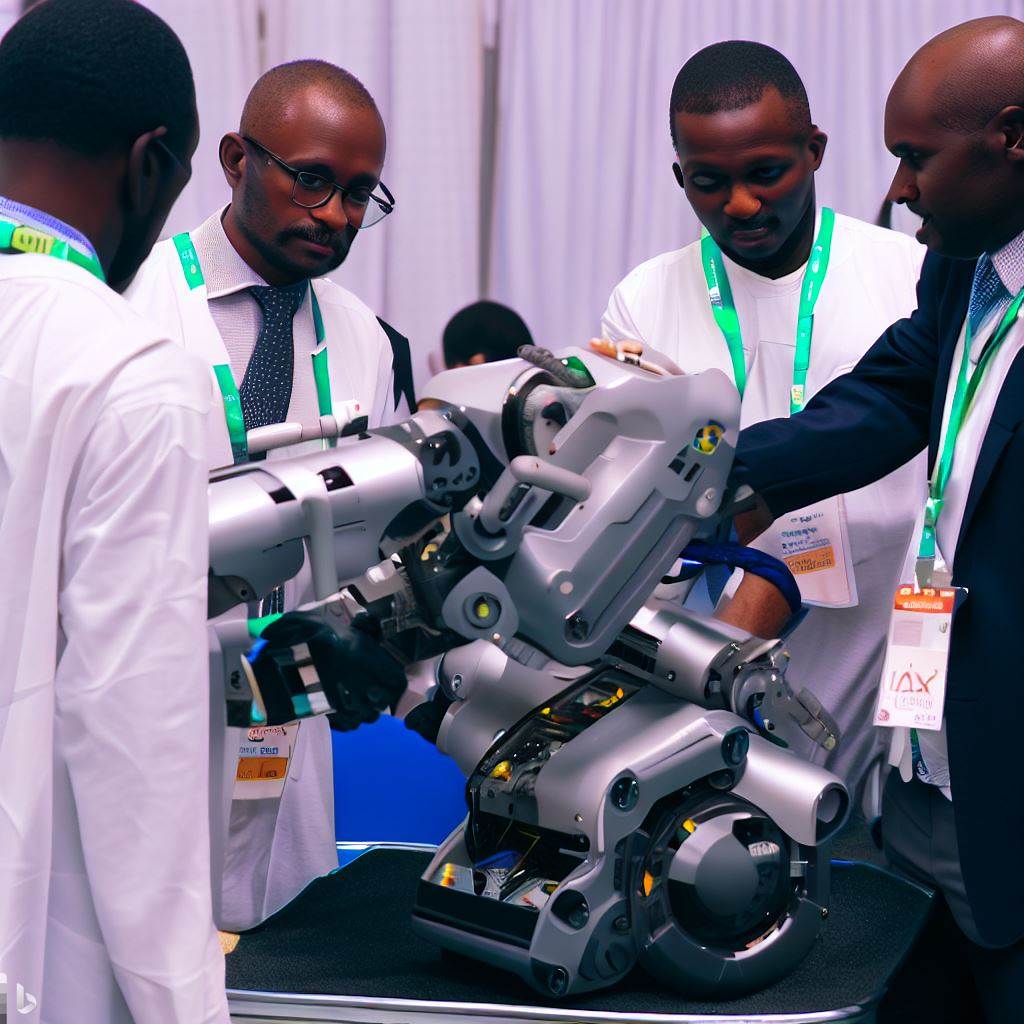Introduction
Robotics holds a crucial position in revolutionizing healthcare in Nigeria through its technological prowess.
The term “robotics in healthcare” denotes the integration of robotic technology into medical procedures and treatments.
This advancement has the potential to reshape the healthcare landscape in the nation.
Robotic technology is poised to elevate medical practices in Nigeria. By offering precision and consistency, robots can assist in surgeries, minimizing human errors.
Additionally, automated systems can efficiently manage patient records and drug dispensation, streamlining healthcare operations.
The role of robotics in diagnostics is undeniable. Automated diagnostic tools can swiftly analyze medical tests, expediting disease detection and enabling prompt interventions.
This has the potential to significantly reduce diagnostic timeframes, positively impacting patient outcomes.
Nigeria’s healthcare sector faces challenges like insufficient medical personnel and limited access to remote areas.
Robotics can bridge these gaps by enabling telemedicine and remote surgeries, ensuring quality healthcare reaches underserved regions.
In essence, the role of robotics in healthcare in Nigeria is poised to be transformative.
Through enhanced medical practices, empowered diagnostics, and overcoming challenges, robotics is set to usher in a new era of improved healthcare delivery across the nation.
Overview of healthcare challenges in Nigeria
When examining the role of robotics in Nigeria’s healthcare improvement, it is essential to first understand the current state of healthcare in the country.
Nigeria faces various challenges in providing adequate healthcare to its population.
Briefly discuss the current state of healthcare in Nigeria
- Inadequate infrastructure: Nigeria’s healthcare system lacks proper facilities, equipment, and infrastructure to cater to the needs of its citizens.
- Insufficient healthcare workforce: There is a shortage of healthcare professionals, including doctors, nurses, and specialists, to serve the growing population.
- Limited access to healthcare: Many Nigerians, especially those in rural areas, have limited access to healthcare facilities due to their remote locations.
- Poor funding: The healthcare sector in Nigeria suffers from inadequate funding, resulting in difficulties in providing quality care and essential medical supplies.
- Lack of health education: There is a lack of awareness and health education among Nigerians, leading to preventable diseases and health complications.
Highlight limitations and shortcomings
- Lack of advanced medical technology: Nigeria’s healthcare sector lacks access to advanced medical technologies and equipment necessary for accurate diagnostics and treatments.
- Poor healthcare data management: The absence of a robust healthcare information system hinders efficient data management for patient records and healthcare research.
- Inefficient healthcare delivery: Long waiting times, overcrowded facilities, and a lack of coordination among healthcare providers contribute to inefficient service delivery.
- Inequality in healthcare provision: There is a significant disparity in healthcare services between urban and rural areas, with urban centers having better access and quality of care.
- High disease burden: Nigeria faces a high burden of communicable and non-communicable diseases, further straining its healthcare system.
- Corruption and mismanagement: Instances of corruption and mismanagement within the healthcare sector undermine the quality and accessibility of healthcare services.
In short, Nigeria’s healthcare system is burdened by various challenges, including inadequate infrastructure, limited access to care, poor funding, and a shortage of healthcare professionals.
Additionally, the absence of advanced medical technology and efficient data management further hampers the delivery of quality healthcare.
Addressing these limitations is crucial to improving healthcare in Nigeria and creating an enabling environment for the integration of robotics in healthcare practices.
Benefits of robotics in healthcare
Robotics offers a wide range of benefits in healthcare, revolutionizing the industry through improved accuracy, reduced human error, enhanced efficiency, and increased access to specialized care, even in remote areas.
Improved accuracy and precision in medical procedures
- Robotic systems enable surgeons to perform complex procedures with enhanced precision and accuracy.
- With robotic assistance, surgeons can make smaller incisions, resulting in reduced postoperative pain and faster recovery times.
- Robots can also provide real-time feedback, improving surgeons’ ability to perform delicate tasks with greater accuracy.
Reduced human error
- Robotic technology helps minimize the risk of human errors during medical procedures.
- Robots follow pre-programmed algorithms, eliminating the possibility of human lapses in concentration or judgment.
- This reduces complications and medical errors, ultimately enhancing patient safety and outcomes.
Enhanced efficiency in diagnosis and treatment
- Robots can analyze vast amounts of medical data and assist healthcare professionals in making accurate diagnoses.
- They can quickly process and interpret medical images, helping physicians detect diseases or abnormalities at an early stage.
- Robotic automation streamlines routine tasks, such as medication dispensing and patient monitoring, freeing up healthcare workers’ time.
Access to specialized care in remote areas
- Robotics allows healthcare professionals to deliver specialized care to patients in geographically isolated or underserved areas.
- Through telemedicine, doctors can remotely diagnose and treat patients using robotic tools and high-definition video conferencing.
- Robotic surgical systems can be operated remotely, enabling expert surgeons to perform procedures on patients in distant locations.
In fact, robotics has tremendous potential to significantly improve healthcare in Nigeria.
The benefits of robotics in healthcare include improved accuracy and precision in medical procedures, reduced human error, enhanced efficiency in diagnosis and treatment, and increased access to specialized care, even in remote areas.
By embracing robotics, Nigeria can enhance healthcare outcomes, increase patient safety, and address healthcare disparities in underserved communities.
Application of robotics in Nigerian healthcare system
Robots play a crucial role in improving healthcare in Nigeria by revolutionizing various areas of medical practice.
From surgical procedures to patient monitoring, robotics technology has made significant advancements in the Nigerian healthcare system, enhancing efficiency, accuracy, and patient outcomes.
Surgical robots and minimally invasive procedures
One of the most significant applications of robotics in Nigeria’s healthcare system is the usage of surgical robots.
These robots assist surgeons in performing complex and delicate procedures with precision and accuracy, minimizing the risk of human errors.
With their small and precise instruments, surgical robots enable minimally invasive procedures, reducing post-operative pain, scarring, and recovery time for patients.
The use of surgical robotics in Nigeria allows healthcare providers to offer advanced procedures that were previously inaccessible, thus attracting patients seeking high-quality healthcare services.
In addition, surgical robots help address the shortage of skilled surgeons by bridging the expertise gap and allowing more healthcare professionals to provide specialized care.
Robotic exoskeletons for physiotherapy and rehabilitation
Another application of robotics in the Nigerian healthcare system is the use of robotic exoskeletons for physiotherapy and rehabilitation.
These wearable devices assist patients with mobility impairments during their therapy sessions.
By providing support and assistance, robotic exoskeletons aid in retraining patients’ muscles and joints, promoting faster recovery and improved motor control.
The use of robotic exoskeletons in Nigeria is especially beneficial for patients with spinal cord injuries or neurological disorders.
These devices offer a new level of independence and mobility, allowing individuals to regain control over their movements and actively participate in their rehabilitation process.
Telemedicine and remote patient monitoring
Telemedicine and remote patient monitoring have emerged as essential applications of robotics in Nigeria’s healthcare system, particularly in rural areas with limited access to medical facilities.
Through telemedicine, healthcare professionals can diagnose and treat patients remotely using robotic technologies.
Robotic telepresence devices, equipped with cameras and screens, enable doctors to interact with patients in real time, offering medical advice, prescribing medication, or conducting virtual consultations.
This approach greatly improves healthcare accessibility for remote communities, reduces travel costs, and ensures that patients receive timely medical attention.
Remote patient monitoring is another crucial application of robotics in Nigerian healthcare.
With the help of robotic sensors and wearable devices, healthcare providers can monitor patients’ vital signs, medication adherence, and other health indicators remotely.
This real-time monitoring allows for early detection of potential health issues, enabling timely interventions and preventing hospital readmissions.
Robotic prosthetics and assistive devices
Robotic prosthetics and assistive devices have transformed the lives of individuals with limb loss or disabilities in Nigeria.
Advanced robotic technology has made it possible for amputees to regain functional mobility and independence.
These prosthetics and assistive devices are designed to mimic natural human movements and enhance the quality of life for users.
With the help of robotics, individuals with disabilities can perform everyday tasks, such as walking, grasping objects, or even playing sports.
This technology not only improves physical capability but also boosts self-confidence and psychological well-being among users.
Generally, the application of robotics in Nigeria’s healthcare system has brought significant advancements, improving patient care, accessibility, and outcomes.
Surgical robots enable minimally invasive procedures, while robotic exoskeletons aid in physiotherapy and rehabilitation.
Telemedicine and remote patient monitoring ensure healthcare access in remote areas, and robotic prosthetics enhance mobility and independence for individuals with limb loss.
As robotics technology continues to evolve, Nigeria’s healthcare sector has a promising future in harnessing its potential for further advancements and improvements.

Challenges and Limitations
Despite the potential benefits and advancements that robotics can bring to Nigeria’s healthcare system, there are several challenges and limitations that need to be addressed:
- High cost of implementation and maintenance. One of the major obstacles is the expensive cost associated with implementing and maintaining robotic technologies in healthcare facilities. The initial investment and ongoing expenses can be prohibitive for many healthcare providers.
- Lack of awareness and acceptance among healthcare providers. There is a general lack of awareness and acceptance among healthcare professionals regarding the capabilities and benefits of robotics in healthcare. Many doctors and nurses are still skeptical about relying on robots for patient care.
- Limited infrastructure and technical expertise. Nigeria’s healthcare system often faces challenges due to limited infrastructure and a shortage of technical expertise. The lack of proper infrastructure and skilled personnel to operate and maintain robotic systems hinders their effective implementation.
- Privacy and security concerns. As robotics involves the use of sensitive patient data, concerns regarding privacy and security arise. Adequate measures must be taken to protect patient information from unauthorized access or breaches.
The above challenges pose significant obstacles to the widespread adoption of robotics in Nigeria’s healthcare system.
However, efforts can be made to overcome these limitations and ensure the successful integration of robotics:
Solutions and Strategies
To address the high cost of implementation and maintenance, the government and healthcare institutions should explore partnerships with technology companies and seek funding opportunities.
This could help lower costs and make robotic technologies more accessible.
Increasing awareness among healthcare providers is crucial. Organizing educational programs, seminars, and workshops can help professionals understand the potential benefits of robotics in healthcare.
Demonstrations showcasing successful implementations can also serve as testimonials.
Investing in infrastructure and developing technical expertise should be prioritized.
Improving healthcare facilities, such as ensuring stable power supply and upgrading equipment, will create a favorable environment for robotics to thrive.
Training programs can also be implemented to build technical expertise in operating and maintaining robotic systems.
Addressing privacy and security concerns requires implementing robust data encryption and authorization protocols.
Strict guidelines and regulations should be put in place to ensure compliance and protect patient information. Collaborating with cybersecurity experts can also enhance overall data security.
In a nutshell, while the role of robotics in Nigeria’s healthcare improvement is promising, it comes with its fair share of challenges and limitations.
Overcoming these obstacles will require collaborative efforts between the government, healthcare institutions, and technology companies.
By addressing the cost, awareness, infrastructure, and security concerns, Nigeria can harness the full potential of robotics to revolutionize its healthcare system and provide better patient care.
Read: Addressing the Skill Gap in Nigeria’s Petroleum Engineering
Robotics initiatives in Nigerian healthcare
The Role of Robotics in Healthcare is transformative, globally and within Nigeria. Despite healthcare challenges, Nigeria is making strides in robotic healthcare integration.
Current initiatives encompass research, development, international partnerships, and government backing.
Research projects focus on robotic surgical systems for precise minimally invasive procedures, and telemedicine robots for remote consultations, bridging healthcare gaps.
Partnerships with global robotics institutes enhance knowledge exchange; a key one concentrates on advanced prosthetics for enhanced mobility.
The Nigerian government significantly supports this evolution. It funds robotic labs and training centers, equipping healthcare professionals for efficient robotic technology utilization.
Tax incentives and grants encourage private sector involvement, fueling local innovation and entrepreneurship.
In sum, Nigeria harnesses Robotics in Healthcare through research, partnerships, and government support. These endeavors promise to surmount healthcare challenges and elevate accessibility and outcomes.
Read: Electronic Engineering Industry: An Overview in Nigeria
Case studies and success stories
Highlight specific examples of robotics implementation in Nigerian healthcare
In Nigeria, robotics has started to make its mark in improving healthcare delivery.
Here, we highlight specific examples of robotics implementation and showcase their positive outcomes and impact.
Robotic Surgery
- The National Hospital in Abuja introduced robotic surgical systems to enhance precision and minimize invasiveness.
- Surgeons have successfully performed complex procedures, such as prostatectomies and hysterectomies, with reduced blood loss and faster recovery.
Telemedicine robots
- In rural areas with limited access to healthcare, telemedicine robots have been deployed to connect patients with doctors remotely.
- These robots enable real-time video consultations, allowing doctors to diagnose and prescribe treatment without physical presence.
Rehabilitation Robotics
- Local hospitals have integrated rehabilitation robots into their therapy programs, assisting patients with physical disabilities.
- These robots provide tailored exercises, monitor progress, and improve patient outcomes through repetitive and precise movements.
Robotic Pharmacy
- Pharmacies have embraced robotic systems to automate medication dispensing and inventory management.
- These robots reduce medication errors, improve efficiency, and enhance patient safety through accurate dosage and timely supply.
Diagnostic Robotics
- AI-powered diagnostic robots have been deployed to analyze medical images and provide preliminary diagnoses.
- This technology can help radiologists detect abnormalities faster and improve accuracy, leading to earlier interventions and better patient outcomes.
Health Monitoring Robots
- Remote health monitoring robots have been introduced to monitor vital signs of patients at home or in remote areas.
- These robots collect data on heart rate, blood pressure, and other vital parameters, transmitting them to healthcare providers for timely interventions.
Healthcare Delivery Drones
- Drones equipped with medical supplies have been used to deliver essential medications and vaccines to remote areas.
- This technology fills the accessibility gap, ensuring timely medical interventions and potentially saving lives.
Positive outcomes and impact Case studies and success stories
These success stories showcase the positive impact of robotics in Nigerian healthcare. Implementing robotics has brought several advantages:
Improved accuracy and precision
- Surgical robots have enhanced surgical precision and reduced errors, leading to better patient outcomes.
- Diagnostic robots provide more accurate interpretations of medical images, aiding in early detection and treatment.
Increased efficiency and productivity
- Robotic systems in pharmacies streamline medication dispensing, reducing wait times and improving overall efficiency.
- Telemedicine robots enable doctors to reach remote patients faster, increasing their productivity and expanding healthcare access.
Enhanced patient safety
- Robotic pharmacy systems minimize medication errors, ensuring patients receive the correct dosage.
- Health monitoring robots enable early detection of abnormalities, allowing for timely interventions and improved patient safety.
Accessible healthcare
- Telemedicine robots and healthcare delivery drones bridge the geographical gap, bringing healthcare services to remote areas.
- Patients in underserved communities can now access specialist consultations and receive essential medications promptly.
In general, robotics has made significant contributions to Nigeria’s healthcare improvement.
From robotic surgery to diagnostic robots and telemedicine, various applications have positively impacted patient care, accessibility, and overall healthcare delivery.
Embracing robotics in healthcare is a step towards ensuring a healthier future for all Nigerians.
Read: Automation & Robotics: Ethics and Legalities in Nigeria
Future outlook and potential growth
In recent years, the field of robotics has witnessed significant advancements and innovation, and Nigeria’s healthcare sector is no exception.
With the potential for expansion in this field, the role of robotics is poised to shape the future of healthcare in Nigeria.
Potential for expansion and advancements in robotics
As technology continues to progress, the potential for expansion and advancements in robotics in Nigeria’s healthcare sector is vast.
The country can tap into the global advancements in robotics and adapt them to cater to its specific needs.
Advancements in artificial intelligence, machine learning, and robotics engineering have paved the way for sophisticated medical robots.
These robots have the potential to revolutionize healthcare delivery in Nigeria by offering precision, efficiency, and improved patient outcomes.
One key area where robotics has gained prominence is in surgical procedures.
Robotic-assisted surgeries have proven to be more precise and less invasive, leading to reduced complications and faster patient recovery.
Publish Your Professional Profile, Business or Brand
Showcase your expertise, gain trust, and boost visibility instantly on Professions.ng.
Publish NowAs the technology evolves, more complex surgeries could be conducted using robotics.
Another area with substantial growth potential is robotic-assisted diagnostics.
Modern diagnostic robots can analyze medical images, assist in accurate diagnoses, and provide real-time data for treatment decisions.
This reduces the chances of misdiagnosis and enhances patient care.
Robots can also play a crucial role in assisting healthcare workers, especially in tasks that involve heavy lifting or transporting patients.
This can lessen the physical strain on healthcare professionals and improve overall efficiency in healthcare facilities.
The role of robotics in shaping the future of healthcare in Nigeria
Nigeria, with its substantial population and limited healthcare resources, confronts significant healthcare hurdles.
However, the integration of robotics offers a promising avenue to surmount these challenges and redefine the nation’s healthcare landscape.
Robotic technology holds the key to expanding access to quality healthcare services, a critical need given Nigeria’s scarcity of skilled medical professionals, especially in rural zones.
Medical robots can bridge this gap by facilitating telemedicine and remote healthcare, ensuring comprehensive medical care for distant patients.
Moreover, robotics promotes healthcare equity by bringing specialized services closer to underserved communities.
Telemedicine robots enable virtual consultations with specialists, mitigating travel-related expenses.
Beyond accessibility and equity, robotics promises substantial cost savings within the healthcare system.
Initial investments notwithstanding, the long-term gains from heightened efficiency, decreased medical errors, and minimally invasive procedures can outweigh costs.
Furthermore, robotics fuels medical research and innovation by fostering collaboration between researchers, engineers, and healthcare experts.
These advancements address Nigeria’s unique healthcare challenges.
However, to realize these benefits, challenges like regulatory frameworks, costs, and acceptance need addressing.
A comprehensive approach involving policymakers, healthcare providers, and the public is essential for seamless integration.
The future of Nigerian healthcare appears promising as robotics drive expansion and progress.
By harnessing global robotic developments and adapting them to local needs, Nigeria can revolutionize healthcare, enhancing patient outcomes and access.
Despite obstacles, proactive measures can pave the way for robotics to play a pivotal role in Nigeria’s healthcare evolution.
Collaborative efforts can unlock the potential for a resilient and efficient healthcare system, shaping a healthier future.
Read: Influence of Foreign Tech on Nigerian Robotics Engineering
Conclusion
As we conclude our discussion on the role of robotics in Nigeria’s healthcare improvement, it is evident that these technological advancements have the potential to revolutionize the healthcare sector in the country.
Throughout this blog post, we have highlighted the importance of robotics in enhancing the efficiency and accuracy of medical procedures, promoting faster recovery rates, and reducing the risk of human errors.
Furthermore, robotics in healthcare has the ability to bridge the gap in access to quality healthcare services, particularly in remote areas where medical facilities are scarce.
However, for the full potential of robotics to be realized in Nigeria’s healthcare system, continued investment in research, development, and implementation of robotics is crucial.
It is imperative for policymakers, government bodies, and private investors to recognize the importance of supporting and funding robotics initiatives in the healthcare sector.
By doing so, we can ensure that Nigerian healthcare remains at the forefront of technological advancements, providing accessible and high-quality care to all its citizens.
In summary, the transformative impact of robotics in Nigerian healthcare cannot be understated.
It has the power to revolutionize medical practices, improve patient outcomes, and address healthcare disparities. Embracing robotics is the key to a brighter future in healthcare for Nigeria.




